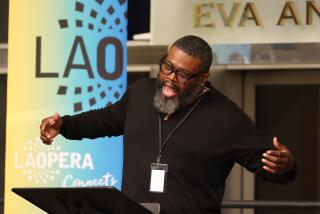Review: Joyce DiDonato dazzles at the Broad Stage
Los Angeles has fallen in love with Joyce DiDonato. Again. On Saturday night at the Broad Stage in Santa Monica, affectionate cheers greeted the mezzo-soprano as soon as she stepped onto the stage. Many bouquets — I counted seven, but there could have been more — were handed up or carried on at the end of her eclectic recital. “You mistake me for someone else,” she said, laughing. But, no, there was no mistake.
The stylish 46-year-old Kansas native, who has sung at Los Angeles Opera, the Broad and Hollywood Bowl, is one of the top singing-actors America has produced, and she becomes the character she is singing. Which DiDonato did the audience fall in love with Saturday? All of them.
Take the three arias in what she called a “Beaumarchais Trilogy,” two from Mozart’s “The Marriage of Figaro” and one from Rossini’s “The Barber of Seville.” Never have I seen Cherubino’s “Voi che sapete” done with such adolescent embarrassment and self-consciousness. She made it a kind of Tom Sawyerish coming-of-age song. She’s from the heartland, after all.
On the other hand, Susanna’s “Deh vieni non tardar” was all longing, sweetness and nuanced awareness of being spied upon by an unseen Figaro, while Rosina’s “Una voce poca fa” was witty, crafty and arch, with perhaps a nod to Maria Callas in the waspish trill ending in that famous explosive “ma!” (but!).
She created these delightful, credible metamorphoses through face, posture, gesture, stage movement and, most important, solid and joyful vocal technique.
The changes were anticipated in the differing vignettes of the opening set of six classical Spanish songs by Obradors. They were reinforced in five closing Venetian songs by Hahn. The latter set included one with vivid hand gestures by a wonderfully jaded, laid-back, over-the-hill Latin lover.
Yet it was in the meat of the program — the demanding arias before and after intermission — that DiDonato most changed shape and form. In addition to the Beaumarchais set, she became a timid, fearful Desdemona, singing the Willow Song from Rossini’s “Otello” with touching lyricism and soaring line.
On the other hand, she became a towering, imperious Cleopatra when singing “Morte col fiero aspetto” from “Antonio e Cleopatra” by the once famously popular but rather quickly forgotten Johann Adolph Hasse.
But it was “Piangerò la sorte mia” from Handel’s “Giulio Cesare” that brought out DiDonato’s greatest vulnerability and most gorgeous, affecting singing, with tastefully added embellishments.
Still in top form, she started her encores with the blockbuster “Tanti affetti in tal momento” from Rossini’s “La donna del lago.” (She sang the title role at the Metropolitan Opera in New York in March.) She followed that with “Non ti scordar di me” by Ernesto de Curtis, and, in a nod to her home state, Arlen and Harburg’s “Somewhere Over the Rainbow.”
Pianist David Zobel proved a model collaborator throughout.
More to Read
The biggest entertainment stories
Get our big stories about Hollywood, film, television, music, arts, culture and more right in your inbox as soon as they publish.
You may occasionally receive promotional content from the Los Angeles Times.










